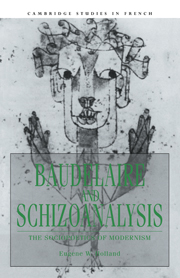6 - Decoding and recoding in the prose poems
Published online by Cambridge University Press: 22 August 2009
Summary
HISTORICAL OTHERS
The series of three published collections of poetry provide one perspective on Baudelaire's life history, but it is not the only one. Essays, letters, editorial comments he made about his poetry, accounts of his life by others, and the poet's own notebooks provide other perspectives. In a remarkable study of the poet, Michel Butor takes as his point of departure a dream Baudelaire recounts in a letter to his friend, Charles Asselineau, and by association the titles Baudelaire envisaged for verse collections prior to Les Fleurs du Mal and his writings on Pierre Dupont and Edgar Allan Poe. It is important to take these other documents into account: not just because any one set of documentation will differ from the others and can therefore provide valuable illumination in its own right, but because in this case, the writings on Dupont and Poe register events that are absent from the lyric poetry itself.
Butor divides Baudelaire's life into “three periods … which correspond to three titles for the poems (Les Lesbiennes, Les Limbes, Les Fleurs du Mal), and, in the author's psychological life, to three successive intercessors: Jeanne [Duval], the [revolutionary] crowd [of 1848], and Edgar Poe” (p. 64). These “intercessors” represent the historical Others in relation to whom Baudelaire constructed major personalities.
Information
- Type
- Chapter
- Information
- Baudelaire and SchizoanalysisThe Socio-Poetics of Modernism, pp. 177 - 220Publisher: Cambridge University PressPrint publication year: 1993
